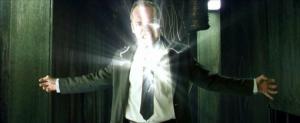Film City of God by Fernando Meireles: summary, analysis and meaning
City of God is a Brazilian action film, based on the homonymous book by Paulo Lins (1997). With a script by Bráulio Mantovani and under the direction of Fernando Meirelles and Kátia Lund, the film was released in Brazil in August 2002.
The film, which had a great international impact, became a landmark of Brazilian cinema when it was Oscar-nominated in the categories of Best Director, Best Adapted Screenplay, Best Cinematography, and Best mounting.
Success not only resides in the visual, technical and aesthetic elements, but also in the social message that he transmits. City of God it shows a Brazil that not everyone knows and that few want to see and, therefore, it is a necessary film.
As Zuenir Ventura, a well-known Brazilian journalist and writer, said:
Watch City of God it is a civic duty.
Synopsis
Between organized crime and police violence, life in Ciudad de Dios is difficult and dangerous. The film, narrated by Buscapé, tells the tragic story of the community's inhabitants and also the life of the protagonist who tries to fulfill his dream: to be a photographer.
Attention from here spoilers!
Resume
Introduction
The film tells the life of several characters who live in the City of God, a favela located in Rio de Janeiro. Buscapé, the narrator-protagonist, tells the story of the community from his perspective, from his childhood.
While the protagonist fled the violence, boys his age like Dadinho and Bené accompanied criminals in the region to commit crimes. Dadinho became Zé Pequeno, a dangerous bandit who took over all the drug trafficking "premises" and became the owner of the region.
Developing
His violence and his lust for power reach the extreme with the death of his partner Bené, who helped keep the peace between criminals. Lonely and desperate, Little tries to seduce a woman, Manuel Galinha's wife, but she rejects him.
Zé Pequeno rapes a woman in front of Mané Galinha and then machine-gun his house. Galinha, who had been an army shooter, begins his revenge and kills twelve men from the enemy gang. To protect himself, he ends up allying himself with Cenoura, a trafficker in the region. Thus begins the war between factions.
For more than a year, men, young people and children are armed and dragged into the confrontation, dying on the streets of Ciudad de Dios. Buscapé, the protagonist, struggles to survive in the midst of chaos and works as a newspaper delivery man, dreaming of a career as a photographer.
When Mané Galinha is arrested and interviewed on television, Zé Pequeno also wants to become famous and calls Buscapé to photograph his gang displaying their weapons. The protagonist takes the photos to be revealed to the newspaper and they end up being published on the front page. The young man finds an opportunity: if he gets more photos of the offender, he will be hired to work at the newspaper.
Conclution
Little's group dwindles over time, and the trafficker ends up recruiting younger and younger children to fight with him. Penniless, he robs his arms dealer, Uncle Sam, who works for a corrupt cop. Mané Galinha dies as a result of a shot given to her by a child who was badly injured on the ground.
The police enter the community in search of the money, Zé Pequeno pays his debt and Buscapé manages to photograph the moment. The trafficker ends up being assassinated by his own gang, which occupies the "smoke mouth".
As the history of violence continues, Buscapé has two options: expose police corruption or sell the photo of the dead criminal to the newspaper. He ends up choosing the second option and pursuing a career as a photographer.
Main characters
Buscapé (Alexandre Rodrigues)
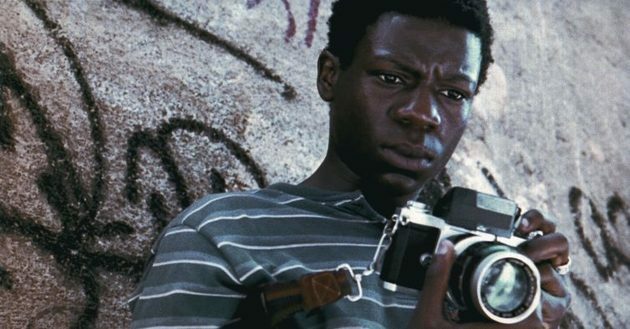
Buscapé grew up in the midst of violence with the desire to have a better and more peaceful life. Inhabitant of City of God, he finds in the war between the sides an opportunity to achieve his dream of being a photographer.
Zé Pequeno (Leandro Firmino)

Dadinho was a child without a family, who admired criminals and learned from them, he dreamed of being the owner of the City of God. When he becomes an adult, Dadinho becomes Zé Pequeno, a violent criminal who is capable of anything to win.
Bené (Phellipe Haagensen)
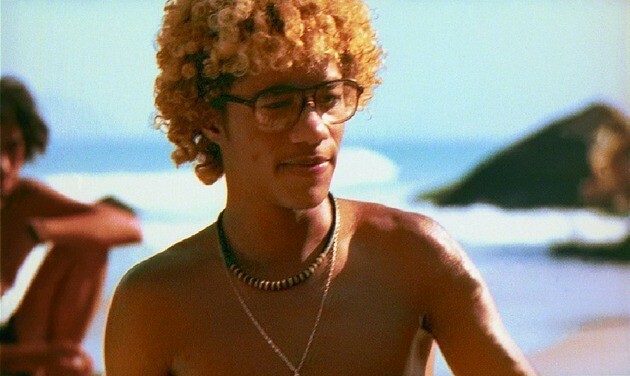
Bené is Zé Pequeno's best friend and also his right-hand man, responsible for controlling the anger of his partner and maintaining peace in the region. Although he is the most admired character in City of God, he is the victim of a stray bullet and dies at his farewell party.
Sandro Cenoura (Matheus Nachtergaele)
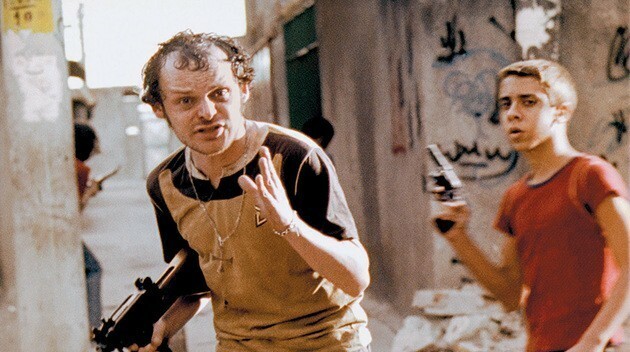
Cenoura is the only trafficker who can resist Zé Pequeno's dominance and maintain his "point of sale". Although he is less cruel than his rival, he is also a criminal who takes advantage of Mané Galinha's situation to promote a war between sides.
Mané Galinha (Seu Jorge)
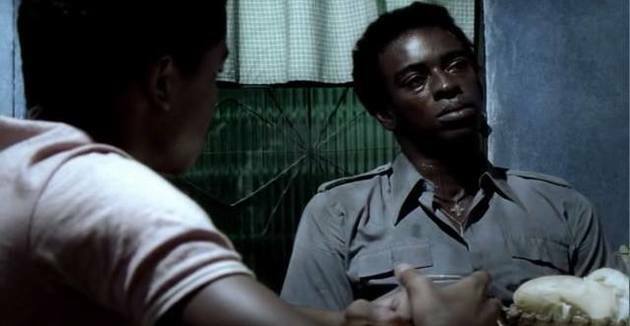
Mané Galinha is a resident of Ciudad de Dios who works as a bus collector. A former army shooter, he lives an honest life until Zé Pequeno becomes obsessed with her partner and rapes her. Upon witnessing the rape, Galinha begins revenge on him. Although he is not a criminal, war makes him a murderer.
Film Analysis
"If you run away they catch you and if you stay they eat you"
The narrative of City of God starts in media res, Latin expression which means "in the middle of the matter". The literary technique allows us to enter the middle of the story, revealing events that happened before through memories and flashbacks.
The first seconds of the film show sharp knives and a chicken trying to escape death when they go to cook it.
The party atmosphere is suddenly interrupted with the escape of the animal. A group of children start running after the hen firing shots into the air. They are under the command of Zé Pequeno, who orders them to catch her. The fleeing hen seems a metaphor for the despair of the residents of Ciudad de Dios, who feel death up close and try to escape at all costs.

At that moment we meet Buscapé, the narrator-protagonist, in front of the hen and Zé Pequeno's group. The young man also lives in the City of God, but flees from the world of crime and fears for his life. With a camera on her shoulder and all guns pointed at her, she hopes to change his fate.
A photo could change my life but, in the City of God, if you flee they will catch you and if you stay they will eat you.
History of City of God
Buscapé makes a retrospective on the history of the place and recalls how the City of God arose. It all started in the sixties, when it was built and many families, who had been left homeless as a result of fires and floods, moved there.
In the words of the narrator, the inhabitants arrived there with the "hope of finding a paradise" but the reality was very different. The place did not have the basic conditions such as water, electricity and asphalt, but the number of inhabitants was growing.
The government did not worry about the situation, since the City of God was "very far from the postcard of Rio de Janeiro."
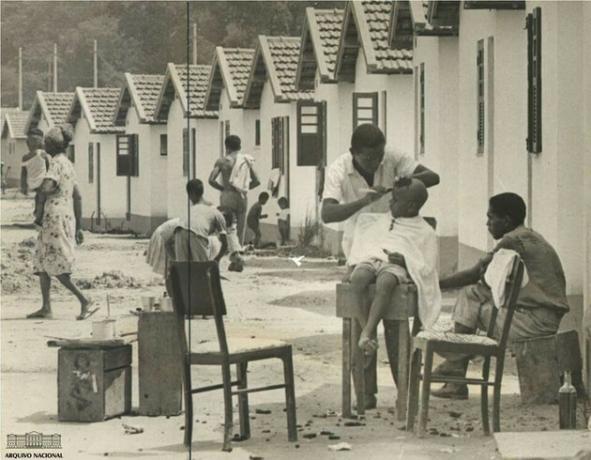
According to the government, the construction was intended to house public officials but was occupied, after a great flood, by former inhabitants of communities in the southern area.
Two decades later, during the 1980s, organized crime increased exponentially and the community became one of the most dangerous places in the city.
Growing up amid the violence
Buscapé is, then, heir and product of that collective history. After recounting the construction and the arrival of the inhabitants to Ciudad de Dios, he recalls his childhood and how he grew up surrounded by violence. We see several children playing with the ball, one of them is the protagonist, who is accompanied by Dadinho and Bené, boys who become traffickers in the future.
During the game Buscapé and Dadinho meet. They appear several times throughout the narrative; the former always faces the latter with fear, but he is ignored. From childhood the personality contrast between the two characters is evident, as if their destinies had already been written: one is peace, the other war.
At that moment, three young criminals attack in the area: Cabeleira, Alicate and Marreco, who together form the Threesome Tenderness. The group used to make small raids in Ciudad de Dios, often accompanied by Bené and Dadinho.
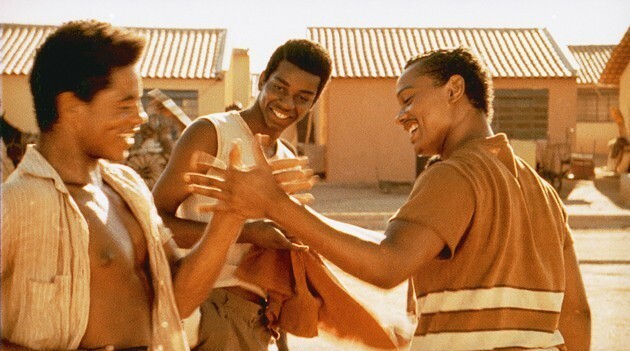
It seems the beginning of a "school of crime" that attracts more and more children throughout the narrative. Bené is Alicate's little brother and learns from him; his best friend, Dadinho, who was an orphan, accompanied them and was the most enthusiastic of all.
On the part of him Buscapé, Marreco's younger brother, preferred to distance himself from such actions. He grew up in the middle of the bullets and, trying to flee the violence, he said that he did not want to be "neither a policeman, nor a thief". Dadinho's aggressiveness is first visible when the trio decides to steal a gas truck. What Robin Hood, robbing the rich to give to the poor, they take the money and let the people of the community collect the gas cylinders.
The truck driver does not object and falls to the ground during the assault. Dadinho takes advantage of the moment of fragility to attack him with kicks. His gratuitous violence and expression of pleasure make it clear that a predator is being bornr. Even though he's just a kid, he smokes marijuana, commits petty crimes, plans attacks, and warns: "I'm a loose bug."
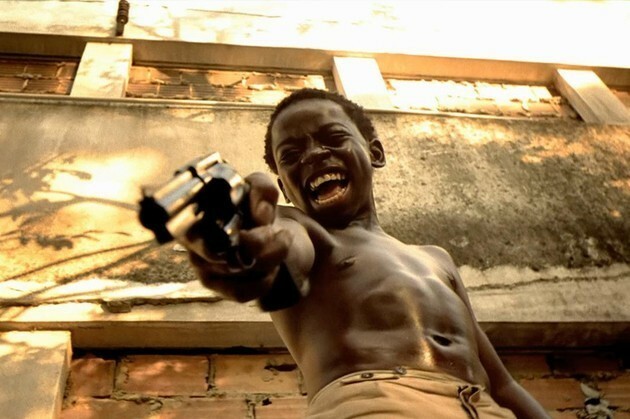
It is Dadinho who suggests the assault on the motel, but he has to remain a watchman because he is still a child: "your time will come." He is responsible for shooting at a glass and warning if the police are coming. Criminals assault motel guests and flee when they hear the sound. When the police arrive they find the place full of bodies; everyone in the motel was killed.
Throughout the film we discover that the one who killed everyone was Dadinho, who gave a false alarm to fool his companions and entered the building shooting everyone. The words of the narrator-protagonist reveal that that night the boy "satisfied his hunger to kill", but his story had only just begun.
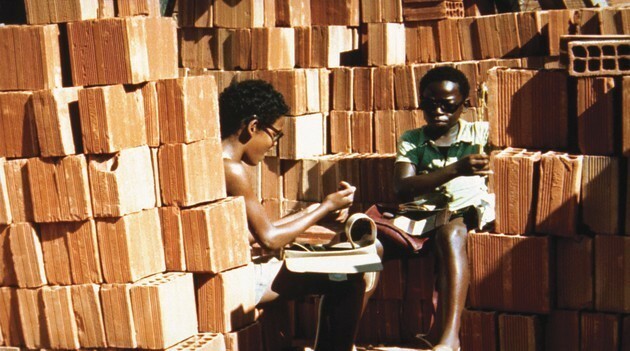
After the assault, Dadinho grabbed the money and fled Ciudad de Dios. He was missing and worked as a shoe polisher on the street, because he "knew how to handle himself." He returns later, prepared to set up his own band with Bené as his right-hand man.
To be a criminal, it is not enough to have a gun in your hand, you have to have an idea in your head and Dadinho had it.
The boy grew up, "between one shot and another", and at age 18 he became Zé Pequeno, one of the most dangerous criminals in Rio de Janeiro. History seems to repeat itself with Filé, a boy who works as a trafficker for him.
When he confronts the kids of Caixa Baixa, a group of abandoned children who commit robberies in the City of God, Small forces Filé to shoot one of them.
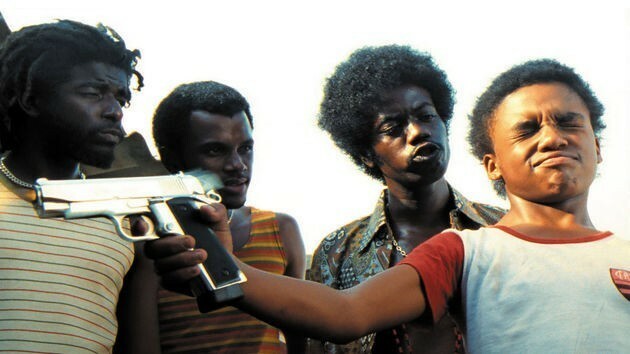
He finally declares: you are "in the group". The scene, quite violent and shocking, shows the fear and innocence of children who live with the danger of death from the moment they are born. When Mané Galinha, Pequeno's rival, meets Filé, he encourages him to stop crime, stating that he is still a child.
His answer reveals a world where childhood does not exist and children are forced to become adults, and criminals, before their time.
What am I a kid? I smoke, sniff, and I've already killed and stolen, I'm already a man.
Organized crime and the "traffic race"
The narrative accompanies the changes that occur in Ciudad de Dios and the arrival of organized crime, especially drug trafficking. The film shows how traffic worked and explains that it was a very profitable and attractive "business" for those individuals. He had a supplier, an assembly line, and even a "career."
Dadinho was an assailant until he learned that Cenoura, a trafficker in the area, was making much more money. Consultation with Exu Sete Caldeiras, his spiritual guide, who gives him a new identity, baptizes him with the name of Zé Pequeno, prophesying that his success: "you are going to be great." Extremely motivated and persistent, the next day he decides to take over all the "outlets" in the region.
It is then that his destiny intersects again with Buscapé's. The protagonist had gone to buy marijuana for Angélica, the chicha that he liked, at the premises of an old classmate. It is interesting to observe the history of Boca dos Apês and the way it passed from generation to generation. It was founded by a widow who needed to support her daughters and was inherited by young criminals.
He is also clear that the police are involved in the strategy, as they accept bribes to turn a blind eye. The business grew so fast that the protagonist affirms that, if it were legal, Small "would be the man of the year". There were fewer and fewer shootings in the favela because he killed all those who disobeyed him, so the outsiders felt safe there and went to buy cocaine.
In this way, Bené befriends Tiago, a rich teenager addicted to cocaine who begins to frequent Ciudad de Dios and ends up working for Zé Pequeno. The friendship arises when the dealer goes after the boy and offers him a large sum of money to buy him clothes like his.
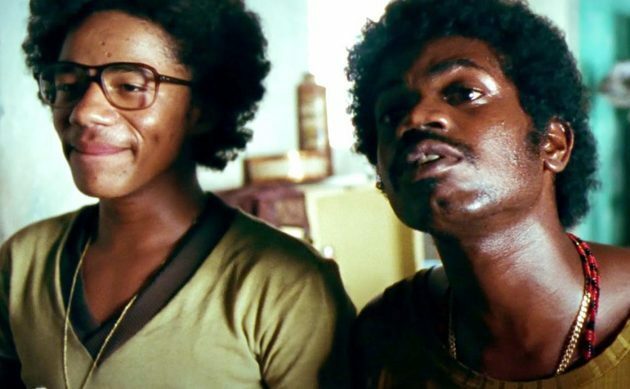
Bené, Zé Pequeno's best friend and right hand since he was a child, was his balance point, the only one capable of calming him down and keeping him from being aggressive. For a long time, he was the one who avoided the side war by preventing his friend from invading the "local" of Cenoura.
There is also a big difference between friends. Little just worked, he just wanted money and power, while Bené was nice, generous, funny, and the "nicest criminal" in City of God.
The story reveals that he did not like violence and only used traffic to enrich himself and be able to get out of there.
Tragic loves and female suffering
Even in the midst of so much death, love is also born in City of God. After Trio Ternura's assault on the motel, the members split up during the escape, saying goodbye with "Faith in God!" Alicate returns to religious life, Marreco goes to work with her father and Cabeleira looks for somewhere to hide, a place of salvation. This is how he meets Berenice.
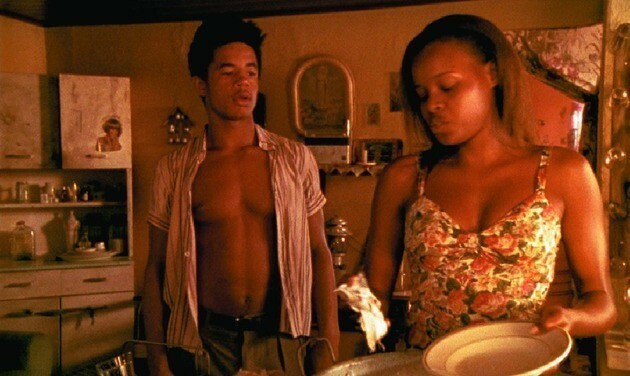
The girl rejects him because she knows that he is a criminal and repeats that he is not trustworthy because "a pimp does not love." The two end up making out and Berenice convinces him to leave the bad life. Everything seems quiet, it sounds Alvorada Cartola as a backdrop and the couple is determined to escape.
However, they try to escape when the police invade the favela in search of the Trio Tenderness. They steal a car and Cabeleira has to push the vehicle to make it start; Inside the car, Berenice watches her boyfriend get shot to death.
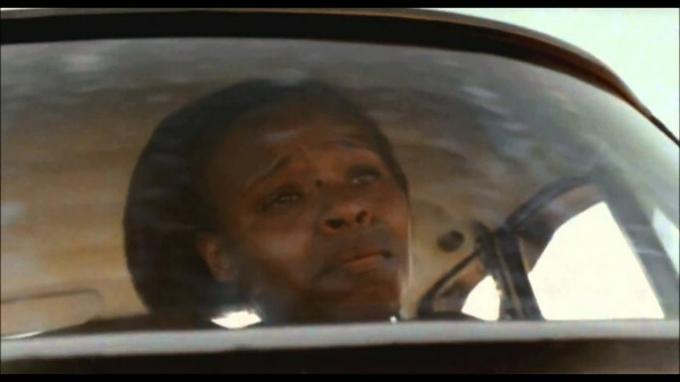
The tragic fate is repeated with Angélica, Bené's girlfriend, who manages to convince him to leave Ciudad de Dios to live together on a farm like hippies.
At the farewell party, when it seems that everything is going well and Bené is going to be happy away from there, he ends up being shot and killed.
The irony of fate highlights that none of these men has an escape, as if all were condemned to tragedy and their partners to suffering.
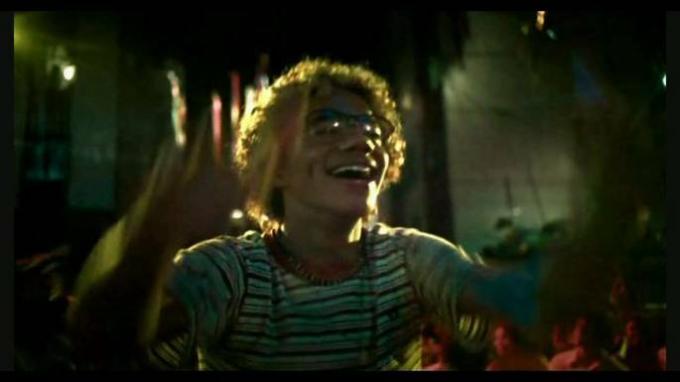
The film also shows the extremely macho and oppressive environment in which women lived. A striking example is the relationship of Paraíba, owner of the bar and police informant, with his wife. First, we see the girl talking about sex with another older woman in which she reveals that her intimacy with her husband is not satisfactory, she says that he is jealous and aggressive.
When Paraíba surprises her wife in her bed with Marreco, Buscapé's brother, assaults her and buries her alive, after she is arrested by the police. The next victim is Mané Galinha's partner, who rejects Zé Pequeno and he decides to rape her.
This sinister event changes the course of the narrative and provokes the start of the war in the City of God, but the woman does not appear again in the story.
Be "owner of the favela"or have a" life of an idiot "?
After the infamous assault on the motel, the Tenderness Trio changed their demeanor. Alicate and Marreco had to spend the night hiding from the police up in a tree. In the morning, Alicate seems to have had an epiphany and decides to go back to church:
This life of a criminal is for crazy people.
Marreco was forced to work with his father and Buscapé had to go with him, understanding since he was a child that having "a delinquent brother is the greatest move." The boy promises that he will never touch a gun and keeps his word. When Cabeleira was killed by the police, the protagonist saw a camera for the first time and then discovered his vocation.
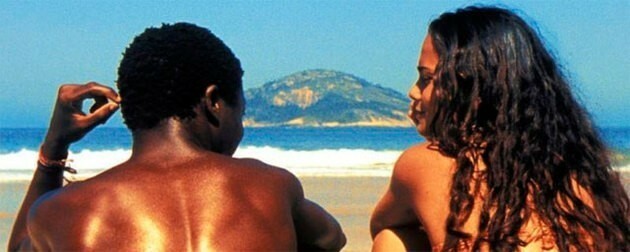
In his adolescence, the young man avoids the conflicts of the City of God and has a group of friends, the "cocotas", who live on the outskirts. Among them is Angelica, the chicha that he likes; When he takes her to a party, he meets Bené and they fall in love with her at first sight. This is one of the moments when the protagonist loses out to criminals and wonders if he will be at an eternal disadvantage.
While Zé Pequeno, who "always wanted to be the owner of Ciudad de Dios", achieved all his goals, Buscapé worked in a supermarket to buy a camera and become a photographer.
Later, the protagonist is fired when the assailants of Caixa Baixa They try to rob the place where he works. For a moment, he thinks about leaving the "idiot life" and going into crime, planning possible crimes.
Find out, kid, it's not worth being honest!
He tries to rob on the empty bus, but recognizes the conductor. He is Mané Galinha, a resident of Ciudad de Dios and a former army shooter. At Bené's party, Mané's girlfriend rejects Zé Pequeno and decides to humiliate him in public.
At that moment, the rivalry begins that ends up killing them. Bit rapes Galinha's wife in his presence and then sends his team to kill him at his house, killing his brother and his uncle. The former shooter attacks the group and kills twelve men.
The next day, everyone hears the news and congratulates him, saying that he "killed well."
The City of God has found a hero.
Side warfare, police corruption and death
Mané Galinha wanted revenge and was determined to kill the enemy: "he believed that he was going to make the revolution but God had other plans." After the attack, he hid in the "local" of Cenoura and realized that he needed an army of criminals to protect himself.
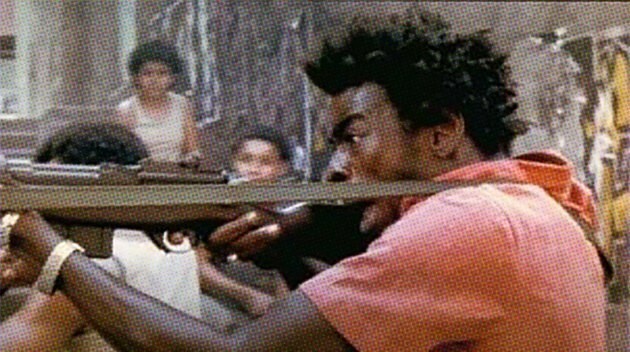
It is at that moment when "revenge turned into a war". Mané agreed to raid with Cenoura's group to win the battle and, although at first he resisted, he soon adapted to life as a criminal.
The city was divided in two: more and more people joined the sides and the war became an "excuse for everything". In the midst of so much gratuitous violence, the police considered all the inhabitants marginal.
If life in the favela It was already a purgatory, it became a hell.
Throughout the film, the conduct of the police officers is corrupt and immoral. On the night of the robbery, two policemen talk and show their true intentions: one wanted to keep the money from the robbery and the other just wanted to kill the criminals.
When Little runs out of money to buy weapons, he decides to rob his dealer, Uncle Sam, who works for a policeman. In other words, the same authority that fights against violence in the community is the one that supplies the weapons.
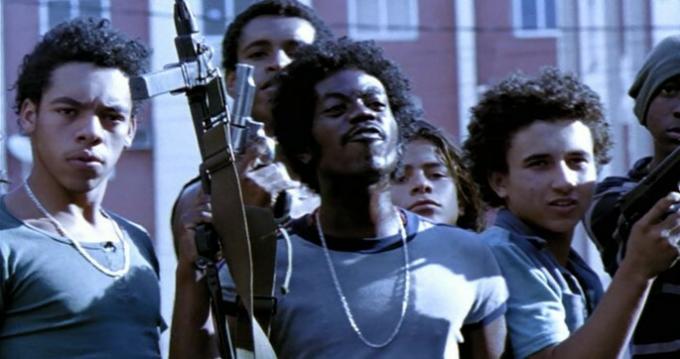
The police backtrack near the end of the narrative, when they come across Zé and his army of armed children. Galinha seizes the moment and makes an ambush, taking down several enemies. When he sees a wounded boy on the ground, he tries to help him but he realizes that he is before the murderer of his father and murders him from behind.
Buscapé photographs hidden from the police invading Ciudad de Dios, bribing Peque and stealing his money.
Ruined, the criminal repents of the war and tells his group that they will have to steal to sustain the "business."
The protagonist photographs the corpse of Pequeno, knowing that that image would guarantee him a job in the newspaper.
Although he has evidence of police corruption, he decides to hide it and deliver only the photographs that show the dead criminal. Faced with a perverse system, which fuels the violence that he supposedly condemns, Buscapé chooses only one possible path: the one that will take him outside the City of God.
Meaning
City of God It is, without a doubt, an unforgettable film. For some community residents, history perpetuates the image that everyone is aggressive and involved in organized crime.
However, when we look at the film, we realize that it seeks to denounce various social problems alarming, which many Brazilians face: poverty, lack of resources, options and opportunities.
Fernando Meirelles and Kátia Lund manage to show the world this circle of death and violence from which it is almost impossible to escape. The directors explain the past of these criminals and their motivations, without limiting themselves only to presenting the world of crime.
They all start out as children who do not attend school or have families, they are left to their own devices. Hungry and without perspective, they live daily with violence and normalize it.
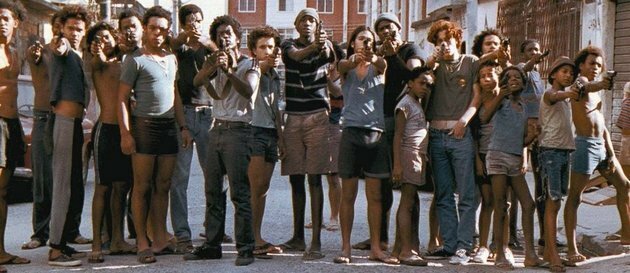
Their idols end up being criminals, those who have money and who are often their only "way out." Thus, crime and trafficking begin to be considered as a "career" possibility, a way to survive in the community and earn money.
Although they are only children, they are treated like men, and are expected to kill and die in the name of their gang, like little soldiers who are fighting without knowing why.
In an extremely sentient way, City of God he does not forget those children for whom crime was the only way out of him. This is confirmed in the last seconds of the film, when the boys of Caxa Baxa They say they want to make a list of his enemies but they can't write.
Even Zé Pequeno, the biggest criminal in the region, started out as Dadinho, a lonely and poor boy who followed the Trío Ternura and dreamed of money and power.
What City of God It seems to show the accomplices of all this: the indifference of the government, the corruption of the police and the morbidness of the media.
Based on real facts
Although it is a fiction, the film talks about some real characters and events. José Eduardo Barreto Conceiçao, better known as Zé Pequeno, was a criminal who became known in Rio during the 1970s and 1980s.
His fight with Mané Galinha and the war are also real. Manoel Machado Rocha committed some robberies during his youth and entered the army at age 18 to serve in the infantry.
He turned to crime to finance the weapons and ended up being murdered by the rival side in his house, in front of his parents and his younger siblings. His family denounced those responsible for the film for their portrayal of Manoel, but they lost the case in 2010.
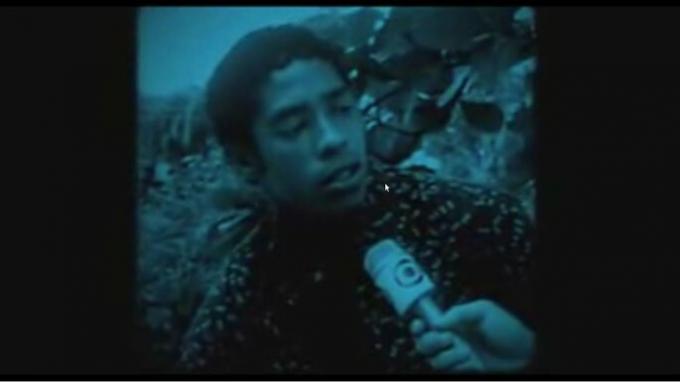
Bené also existed and was a good friend in the childhood of Little. He worked in a bakery and committed assaults with his partner, then joined the drug trade. The stories tell that he was a man known for his generosity and his sympathy since, despite being a criminal, he did not like violence and was not armed.
Little's friend died during a carnival party from a shot that was aimed at the troupe. Who confirms some of these events is Ailton Batata, the only survivor in history. Portrayed as Sandro Cenoura, he discovered the film while in prison and wrote a book in 2017 titled: Citadel of Deus- A History of Ailton Batata, or survivor.
Finally, the main character was inspired by José Wilson dos Santos, a photographer who lived in Ciudad de Dios and lived with the "owners of the favela". Buscapé was born from the combination of his life story and the imagination of Paulo Lins, author of the book.
Trailer
About the production
Fernando Meirelles got the book thanks to the gift of a friend, Héctor Dhalia, who suggested that they make a film adaptation. Although he felt quite removed from that reality, the director became interested in the project and sought out Paulo Lins to buy the rights to the film.
As a matter of representation, she set up a theater workshop for young people in the periphery, since she wanted to work with people who identified and knew that world closely. Among the hundreds of students who studied and tested, Meirelles and Lund chose the cast for the film.
Technical sheet and poster
| Direction | Ferando Meirelles, Kátia Lund |
| Duration | 130 minutes |
| Country of origin | Brazil |
| Premiere | 2002 |
| Gender | Drama, Police |
| Classification | Not recommended for children under 16 years of age |
| Script | Bráulio Mantovani |
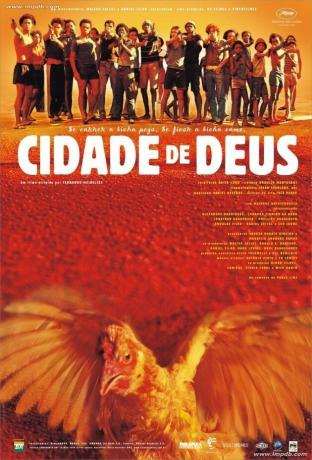
You can also read:
- Fight Club Movie
- Movie A Clockwork Orange by Stanley Kubrickt
(Text translated and adapted by Marian ortiz).

